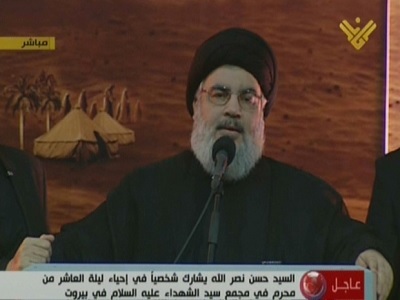
By Belen Fernandez
Yesterday, an Israeli helicopter air strike on the Syrian province of Quneitra reportedly killed six militants from Lebanon’s Hezbollah as well as six Iranian soldiers, including senior commanders. Hezbollah and Iran have joined forces with Syrian President Bashar al-Assad in what has degenerated into a war against Sunni jihadists.
Among the casualties was Jihad Mughniyeh, a Hezbollah commander and the son of late Hezbollah icon Imad Mughniyeh, himself assassinated by the Mossad in Damascus in 2008. The accused mastermind of various plots against Israeli and other targets, Imad was not the first Mughniyeh to meet his end at the hands of Israeli intelligence. As Dan Raviv and Yossi Melman document in their book Spies Against Armageddon: Inside Israel’s Secret Wars, his brother Fuad was blown up in southern Beirut in 1994 in a Mossad-concocted “dead bait” scheme to lure Imad back from hiding abroad: “It was hoped that Imad could not resist the Shi’ite fraternal duty of attending Fuad’s funeral.”
The elimination of a third Mughniyeh, the offspring of Israel’s former most wanted, is thus heavily charged with symbolism and essentially forces some sort of retaliation from Hezbollah. Adding to the powder keg situation is the fact that the air assault occurred a mere three days after Hezbollah Secretary General Hassan Nasrallah warned the Jewish state of imminent reprisal attacks for continuing Israeli military strikes in Syria.
Given the proximity of Hezbollah’s headquarters to Israel and the Party of God’s relative freedom of movement as a non-state actor that receives sponsorship from Iran, it’s only natural that retaliatory duties might fall to it rather than to the Islamic Republic.
Of course, many have questioned why Hezbollah – an organization whose official function is to defend Lebanese territory against Israeli predations – has deemed itself and its allies uniquely entitled to intervene in Syria’s bellicose affairs. But the group’s supporters also offer valid arguments.
Following yesterday’s attack, Lebanese scholar Amal Saad-Ghorayeb, author of Hizbu’llah: Politics and Religion, lambasted “anyone who still calls on Hezbollah to ‘stop fighting fellow Muslims and go back to resisting Israel’ when it is clear that Syria is another battlefield for Israel which has been providing air support for AL-Qaeda-affiliated groups in Quneitra.”
An Israel National News article presents one hypothesis regarding the timing of the killing of Mughniyeh et al.
Quoted in the piece is Major General (res.) Yoav Galant, the former head of the Israel Defense Forces’ Southern Command and a candidate for Knesset in upcoming national elections, who states that, “from events in the past, you can learn that sometimes the timing is not unrelated to the subject of elections.”
Among past events invoked by Galant is the 2012 killing of Hamas commander Ahmad Jabari at the outset of Israel’s Operation Pillar of Defense, the murderous military rampage that took place in the Gaza Strip in the run-up to Israeli elections in 2013. In Galant’s view, apparently, yesterday’s operation may have been designed in part to bolster Prime Minister Benjamin Netanyahu’s electoral performance in 2015.
But if this is the case, it’s a pretty risky PR move, given that it might result in a new confrontation between Israel and Lebanon, two states that have remained officially at war since the former’s birth in 1948.
It bears recalling that Hezbollah holds the distinction of being the only regional entity to have ever triumphed over the Israeli foe, which was forced to end its 22-year occupation of southern Lebanon in May 2000 following a long-term campaign of concerted harassment by the Party of God and allied outfits.
Nor did Israel fare that stunningly in post-withdrawal military altercations – namely its 2006 war on Lebanon, during which its ability to wreak disproportionate and criminal destruction failed to translate into any semblance of victory and simply boosted Hezbollah’s popularity in the region.
This is not to say Lebanon has nothing to fear from renewed overt hostilities with its southern neighbor. The sheer magnitude of damage inflicted upon the country in 2006 – both in terms of civilian life and national infrastructure – highlights the positively sadistic nature of subsequent Israeli threats to cease distinguishing between Hezbollah targets and the Lebanese state in future conflicts.
Neither the timeframe for retaliation from Hezbollah nor the precise nature of its retribution can be predicted. What is clear, however, is that Israel’s perennial squawking about the paramount importance of its own self-defence and security is a delusional fantasy. After all, there’s no room for security in deliberately reckless provocations like yesterday’s airstrike.
And while the argument can be made that Hezbollah’s machinations in Syria constitute a reckless provocation in themselves, this ignores the fact that the group sees the preservation of the Syrian regime as crucial in resisting Israeli geopolitical designs.
Finally, let’s not forget that Hezbollah’s very existence is a result of provocation by Israel, which during its devastating 1982 invasion of Lebanon – in an ostensible effort to eradicate that other reaction to Israeli oppression, the Palestine Liberation Organization – managed to sow the seeds for the rise of Hezbollah, thereby vastly expanding threats to Israel’s “security”.
At the end of the day, the reality is simple: the Zionist enterprise is predicated on a proliferation of insecurity in the name of security, a context that excuses eternal militarization and attendant corporate profits along with territorial usurpation and other punitive measures against folks at home and abroad.
Yesterday’s activities will presumably only fortify the arrangement. As they say, there’s nothing like an airstrike while the iron is hot.
– Belen Fernandez is the author of The Imperial Messenger: Thomas Friedman at Work, published by Verso. She is a contributing editor at Jacobin magazine. (This article was first published in Middle East Eye)





